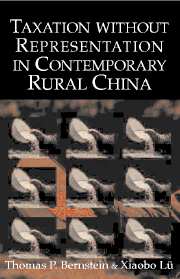Book contents
- Frontmatter
- Contents
- List of Journals, Newspapers, Translation Services, and Abbreviations
- List of Tables and Figures
- Preface
- 1 Introduction
- 2 Peasants and Taxation in Historical Perspective
- 3 Extracting Funds from the Peasants
- 4 Institutional Sources of Informal Tax Burdens
- 5 Burdens and Resistance: Peasant Collective Action
- 6 Containing Burdens: Change and Persistence
- 7 Burden Reduction: Village Democratization and Farmer National Interest Representation
- 8 Conclusions
- Bibliography
- Index
1 - Introduction
Published online by Cambridge University Press: 13 July 2009
- Frontmatter
- Contents
- List of Journals, Newspapers, Translation Services, and Abbreviations
- List of Tables and Figures
- Preface
- 1 Introduction
- 2 Peasants and Taxation in Historical Perspective
- 3 Extracting Funds from the Peasants
- 4 Institutional Sources of Informal Tax Burdens
- 5 Burdens and Resistance: Peasant Collective Action
- 6 Containing Burdens: Change and Persistence
- 7 Burden Reduction: Village Democratization and Farmer National Interest Representation
- 8 Conclusions
- Bibliography
- Index
Summary
FOR more than fifteen years China's top leaders called for the “lightening of the peasants' burden,” a term that referred to the imposition on villagers of “unreasonable” ad hoc fees, fines, local taxes, assessments on peasant households, or apportionment of governmental expenses among them. Some of these were authorized; many were not; most had at best a dubious basis in law and official regulations. Most were bitterly resented by the peasants for their unpredictability and open-endedness and the coercive manner in which they were collected. Year after year, central leaders and agencies sent edicts, directives, injunctions, exhortations, and pleas down the administrative hierarchy demanding that action be taken to lighten peasant burdens, but to no avail. In l985 the Central Committee (CC) of the Chinese Communist Party (CCP) and the government's State Council warned that excessive burdens were damaging the authority of the regime and were causing rural unrest and instability. Similar warnings, often in somber tones, have been issued in the years that followed. In the most recent period, rural disturbances arising from burdens and other abuses have become even more worrying to the central leadership. So impressive a record of ineffectuality calls for investigation, analysis, and explanation.
We believe that examination of peasant burdens illuminates two fundamental problems of contemporary Chinese political development. The state faces major challenges in building administrative capacities appropriate to governance in the post-Mao reform era.
- Type
- Chapter
- Information
- Publisher: Cambridge University PressPrint publication year: 2003
- 3
- Cited by

